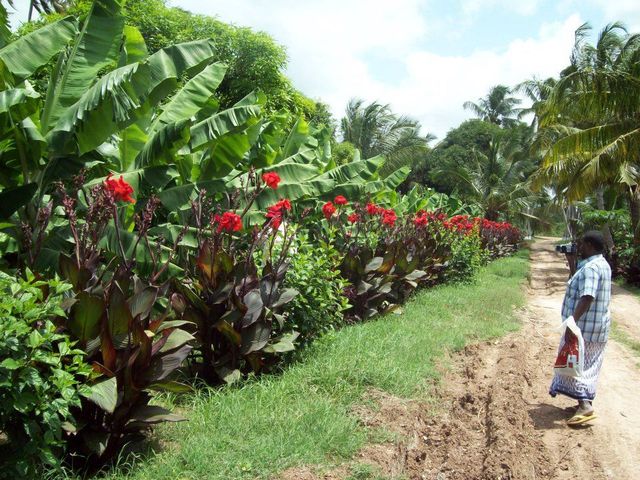City dwellers throng Afgoye, the new get-away destination for Mogadishu residents to mark Eid

 Clad in their finest outfits and each clicking away as they sought to capture images of the lush and serene environment on their phones, hundreds of Mogadishu residents drove to Afgoye, 30 kilometres south of Mogadishu for picnic as part of Eid celebrations, Friday.
Clad in their finest outfits and each clicking away as they sought to capture images of the lush and serene environment on their phones, hundreds of Mogadishu residents drove to Afgoye, 30 kilometres south of Mogadishu for picnic as part of Eid celebrations, Friday.
In express defiance of explosions and killings by the militant group Al-Shabaab during the just ended holy month of Ramadan, families, friends and lovers threw caution into the air for a picnic which to many was almost fictional a while ago.
“I came here to enjoy the fresh air from these plantations. I also want eat fresh fruits straight from the farm.This is once in a year opportunity that should not be missed,” said Najma Mohamed who accompanied by her female friend.
The stretch of fruit plantations and criss-crossing rivers make Afgoye an ideal city dweller’s escape destination away from the bustle and bustle of Mogadishu coupled with the steaming heat and humid air from the Indian Ocean.
Ahmed Abdisalan Moose who drove with his family told Goobjoog News a drive away from the city was the best thing for his family. “I am busy throughout the week, so I never get quality time with my family but today is what I had always looked forward to. Besides the usual outing to a hotel in the city, a walk through the farms is an exceptional treat for me and family,’’ said an elated Ahmed.
A number of those who spoke to Goobjoog News attest to the improving security situation in the country and prospects for a developed Somalia which could in the near future be a tourist’s destination from any part of the world.
“This year’s Eid is very different from last year. We can travel to and out of the city without fear of any security threats. I feel so comfortable here and I don’t even feel like going back home,’’ said Abdi Hussein Ibrahim a resident of Waberi District in Mogadishu.
For taxi drivers and public service vehicle owners, it’s all a fortune unknown to them since their income has always come from normal transport of passengers but not from holiday makers.
“We have been busy since morning transporting people from the city to different parts of Afgoye. Since they do not know the place, they request us to help them find a quiet and panoramic place where they can take pictures and have fun,’’ said Nuradin Bashir Abdullahi, a taxi driver in Afgoye.
Nuradin charges between $5 and $10 depending on time and distance.
Eat to your fill but don’t carry
Unlike many picnic sites elsewhere, a visit to Afgoye plantations does not just afford you the chance to take pictures and enjoy the cool environment; one is spoilt for choice on a variety of fruits ranging from oranges, bananas, mangoes to paw paws. But there’s one cardinal rule, you can feast to your fill but not carry even a seed.
“You are free to walk around the plantations, pick any fruit you like but you are not allowed to carry even one piece outside the farm,’’ said Ahmed Dhobey, one of the farm managers.
However Ahmed says opening up the farm as a tourist site may not be sustainable since people may interfere with farm operations and even destroy some things. “We urge the government to set up a public park around this place so that people can access it any time and spend good time with their families,” added Ahmed.
The only well-established park in Afgoi is Sheik Zayid Bin Sultan Al-Nahyan Park, owned by the government of United Arab Emirate (UAE) but there is no access to the public. Only visiting dignitaries often get opportunity to tour. The park dates back to the time of Mohamed SiyadBarre and was named after UAE ruler Sheik Zayid Bin Sultan Al-Nahyan 1971–2004.
On that note, one could feel the shifting needs and priorities of citizens as Somalia struggles to put behind 25 years of anarchy. One government official requested anonymity told Goobjoog News, “It’s very strange you are asking me about public parks, some years ago rebels used to run the affairs of this city, there was no peace, people vacated out of fear of their security”.
By Abdinasir Bashir Ahmed